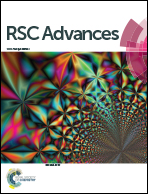Continuous heterogeneous hydrogenation of CO2-derived dimethyl carbonate to methanol over a Cu-based catalyst†
Abstract
Catalytic mild hydrogenation of carbonates synthesized from the CO2 captured by alcohols is of significant interest both conceptually and practically, which provides alternative approaches to the indirect hydrogenation of CO2 to methanol. However, the catalytic efficiency of the process of dimethyl carbonate (DMC) hydrogenation still remains unsatisfactory. Unprecedented gas–solid phase fix-bed catalyzed hydrogenation of DMC to methanol has been made. Herein, we address this issue with facile Cu/SiO2 catalysts, reaching complete conversion and highly selective formation of methanol (up to 80% yield) under mild conditions (503 K, 2.5 MPa), which is the highest yield that has been reported. Characterization results indicate that the copper dispersion and the synergetic effect between balanced Cu0 and Cu+ sites are considered to play critical role in attaining high yield of methanol. The optimized Cu/SiO2 catalyst displayed excellent catalytic performance in the hydrogenation of diethyl carbonate (DEC) and di-n-propyl carbonate (DPC) as well, presenting a broad substrate scope. Moreover, the comparative catalytic activity (∼76% methanol yield) in the hydrogenation of DMC under solvent-free conditions shows promise for its scalable application in industry.


 Please wait while we load your content...
Please wait while we load your content...